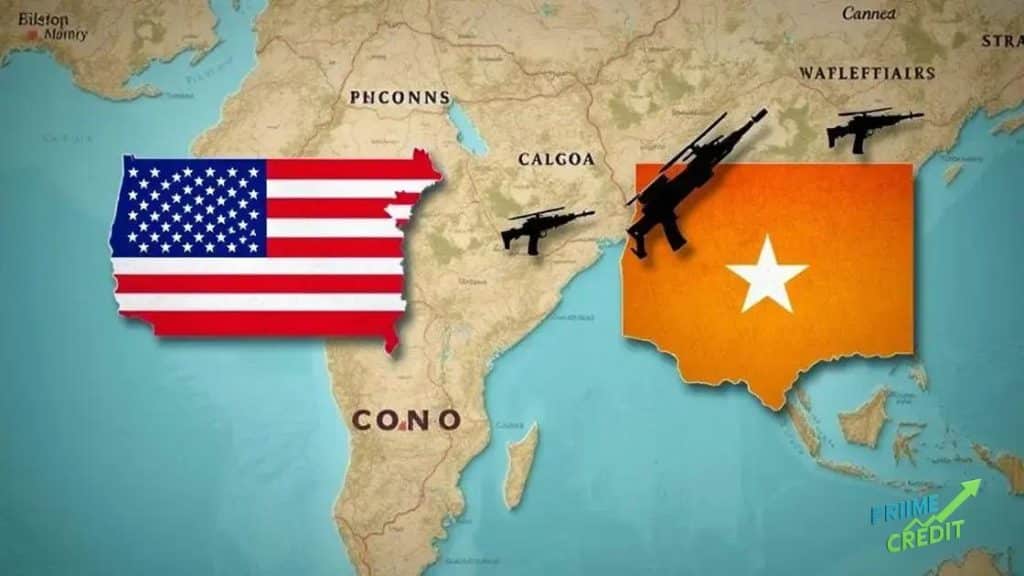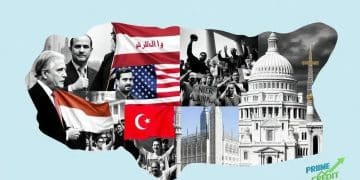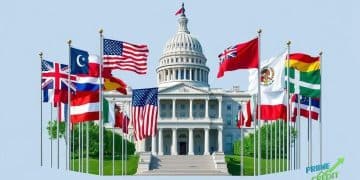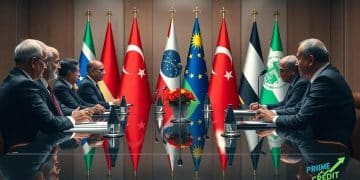Criticism of U.S.- Congo military protection deal

The criticism of the U.S.-Congo military protection deal highlights concerns about sovereignty, local community impact, and the balance between security support and respect for human rights in the region.
Criticism of U.S.-Congo military protection deal has sparked a lively debate in diplomatic circles. What does this mean for the security and sovereignty of both nations? Let’s dive into the intricacies of this significant issue.
Historical context of U.S.-Congo relations
The historical context of U.S.-Congo relations is complex and multifaceted. To understand the current criticism regarding the military protection deal, it’s crucial to look back at significant events that shaped this relationship.
Colonial Legacy
The Congo has a deep historical background marked by colonial exploitation. From the late 19th century, King Leopold II of Belgium claimed Congo as his personal property. This led to vast human rights abuses and economic exploitation, which created a mistrust of foreign powers.
Cold War Dynamics
During the Cold War, the U.S. became involved in Congo, particularly after the assassination of Prime Minister Patrice Lumumba in 1961. The U.S. supported Mobutu Sese Seko, who ruled for over three decades. This intervention was fueled by the fear of Soviet influence, impacting the nation’s politics significantly.
Post-Cold War and Recent Years
In the years following the Cold War, Congo faced a series of conflicts, leading to a humanitarian crisis. The U.S. struggled with how to engage amidst civil unrest. Recently, the focus has shifted to how military partnerships, like the current protection deal, are viewed as either necessary safeguards or repressive alliances.
- U.S. historical interventions are seen as controversial.
- Economic interests often overshadow humanitarian concerns.
- Longstanding perceptions affect current diplomatic dialogues.
As we assess the recent military protection deal, it’s important to recognize how the past influences contemporary relations. The Congo’s struggle for sovereignty continues against the backdrop of foreign involvement.
Understanding this historical context allows us to critically evaluate the implications of military deals that might seem helpful on the surface but could have deeper, more problematic roots.
Key points of the military protection deal
The key points of the military protection deal between the U.S. and Congo are critical to understanding its potential impact. This agreement aims to strengthen security and address ongoing conflicts in the region.
Objectives of the Deal
The foremost objective is to enhance the stability of the Congolese government. By providing military support, the U.S. intends to help Congo combat armed groups that threaten peace. Another significant aim is to foster economic development through improved security.
- Support for military training and resources.
- Collaboration on intelligence sharing.
- Efforts to strengthen regional partnerships.
This deal also emphasizes the need for accountability and respect for human rights. The U.S. aims to ensure that its support does not enable abuses during military operations. This aspect reflects a shift toward a more responsible engagement in foreign policy.
Regional Implications
The repercussions of this deal might extend beyond Congo. Strengthened security in Congo could lead to greater regional stability, affecting neighboring countries. However, some critics argue this could also lead to prolonged military involvement or exacerbate tensions.
Moreover, the strategic interest in Congo’s natural resources continues to fuel the collaboration. Ensuring peace allows for safe extraction and business operations, driving a dual motive behind the military deal.
Understanding these key points is essential as they outline the foundations and potential consequences of this military protection agreement. As critics raise questions about effectiveness and intentions, these aspects demand attention in the broader discourse on U.S.-Congo relations.
Reactions from local and international communities
Reactions from both local and international communities regarding the military protection deal are varied and intense. The perspectives highlight differing opinions on the implications this agreement has for Congo and global dynamics.
Local Responses
Within Congo, the reactions are mixed. Many citizens appreciate the U.S. support, believing it could enhance security and combat armed groups. Others, however, express skepticism, fearing that this could lead to foreign interference in local affairs. There is a strong sentiment that military support should respect sovereignty and prioritize human rights.
- Some view it as a necessary evil to combat violence.
- Others worry it may lead to increased militarization.
- Activists call for transparency and accountability in military actions.
Grassroots organizations advocate for a focus on social and economic development rather than solely military solutions. This reflects a desire for a balanced approach to these pressing issues.
International Perspectives
Internationally, reactions vary based on geopolitical interests. Some countries support the deal, seeing it as a means to stabilize a crucial region. Others criticize it, arguing that it perpetuates neo-colonial dynamics. The differing views often depend on each nation’s interests in Congo’s rich resources.
Human rights organizations worldwide express concern regarding the implications of this military deal. They emphasize the need for accountability and monitoring of the situation to prevent abuses. Support for the deal remains contentious among member nations of organizations like the United Nations.
Understanding these reactions from local and international voices is vital as they shape the discourse around the U.S.-Congo military protection deal. The diversity of perspectives showcases the complexities and potential consequences linked to this significant agreement.
Potential consequences for regional stability
The potential consequences for regional stability arising from the U.S.-Congo military protection deal are complex and significant. This agreement could shape not only Congo’s future but also influence neighboring countries and overall regional dynamics.
Security Enhancements
One immediate effect could be improved security within Congo. With better military support, the Congolese government may effectively combat armed groups that pose a threat to peace. A stable Congo could mean a reduction in violence, which would likely spill over into surrounding nations.
- Increased military training for local forces.
- Enhanced resources to manage conflicts.
- Collaborative efforts to address cross-border issues.
However, this enhancement comes with concerns about militarization. Critics argue that reliance on military solutions may overshadow the need for diplomatic approaches and community engagement.
Regional Tensions
In contrast, the military deal may also escalate tensions with neighboring countries. Some nations might view U.S. involvement as a threat, prompting them to increase their military capacities in response. This could lead to an arms race in the region, rather than fostering a collaborative atmosphere.
Congo’s rich natural resources make it a focal point of interest, and the deal may exacerbate existing rivalries among neighboring nations. The involvement of external powers can complicate relationships and lead to misunderstandings or conflicts.
Furthermore, local communities might feel the effects of increased military presence. They may experience disruptions and heightened tensions as operations ramp up. It’s crucial that the military efforts are balanced with initiatives that encourage community stability.
Understanding the potential consequences for regional stability is vital in assessing the broader impacts of this military protection deal. It could represent a path toward peace or introduce new complexities into an already volatile environment.
Future outlook of U.S.-Congo collaboration
The future outlook of U.S.-Congo collaboration hinges on several important factors, which could shape the dynamics between these two nations. As they navigate their relationship, various elements will play a crucial role in determining the effectiveness and sustainability of their cooperation.
Strategic Partnerships
One aspect of the future collaboration involves deepening strategic partnerships. The U.S. aims to work closely with the Congolese government to ensure security while addressing key regional issues. A focus on mutual goals can foster cooperation that supports not only military objectives but also economic development efforts.
- Shared interests in combating armed groups.
- Joint initiatives for economic and social development.
- Collaboration in health and education sectors.
This multifaceted approach can strengthen ties and lead to better outcomes for both nations.
Challenges Ahead
Despite the opportunities, numerous challenges remain. Local concerns about sovereignty and potential abuses must be addressed. The Congolese people’s trust in the military collaboration is essential for it to succeed. If perceived as an extension of foreign control, the partnership could face significant backlash.
Moreover, geopolitical factors may complicate relations. The involvement of other nations in the region can influence the dynamics and necessitate careful diplomacy. The emphasis on transparency and accountability will be vital in navigating these challenges while ensuring support.
The future of U.S.-Congo collaboration also calls for an adaptive approach that takes local needs into account. This includes listening to communities and fostering development that aligns with their priorities. The partnership should not only focus on security but also on building long-term relationships that promote stability and development.
<pUltimately, understanding the future outlook of U.S.-Congo collaboration is essential for grasping how military and diplomatic interactions will evolve. The balance between security, respect for sovereignty, and developmental support will be key to a beneficial partnership.
In conclusion, the U.S.-Congo military protection deal is a significant agreement that carries both potential benefits and challenges. While it aims to enhance security and stability in the region, it also raises important questions about sovereignty and local perceptions. Moving forward, the success of this collaboration will depend on mutual respect, accountability, and a focus on long-term development alongside military support. Engaging local communities and addressing their needs will be crucial for fostering trust and achieving a successful partnership in the years to come.
FAQ – Frequently Asked Questions about the U.S.-Congo Military Protection Deal
What is the main objective of the U.S.-Congo military protection deal?
The main objective is to enhance security in Congo by providing military support to combat armed groups that threaten peace.
How do local communities feel about the military deal?
Local communities have mixed feelings, with some seeing it as necessary for security, while others are concerned about loss of sovereignty and foreign interference.
What are the potential challenges facing this collaboration?
Challenges include addressing concerns about human rights, managing regional tensions, and ensuring the support is well-received by local populations.
Why is community engagement important for the success of the deal?
Community engagement is vital as it builds trust, promotes transparency, and ensures that initiatives align with the needs and priorities of the local population.





